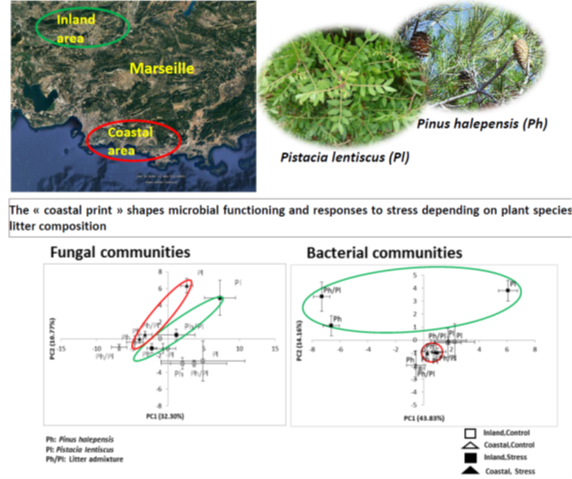Maya Kheir (OT-Med PhD student)
AM Farnet Da Silva (IMBE)
Philip Roche (RECOVER, IRSTEA)
Collaboration with Fédération des Sciences Chimiques de Marseille, AMU ; IEES-Paris ; Laboratoire des Ressources hydrologiques et environnementales, Université de Saïda, Algérie.
Litter decomposition is a process of major importance since organic matter (OM) transformation supports nutrient recycling, primary production, regulation of carbon dioxide emission (via C storage) and provisioning services such as wood and fiber production. It is driven by local interactions between organic matter quality (litter type) and quantity and scavenging microorganisms such as bacteria and fungi, which are subjected to global and regional pedoclimatic constraints. The multiple environmental factors driving this crucial process make difficult to assess the vulnerability of microbial functions in Mediterranean forest litters to climate change and to forecast changes in the dynamics of OM decomposition.
This project aims will aim at determine i) how soil microbial community functioning can be driven by the specific characteristics of forest stand assemblages ii) how responses of microbial communities, differently shaped by environmental conditions (OM quality and quantity, topography, climate conditions...) acting at various spatial scales, may vary when facing matric stresses.
We investigated
1) how litter microbial functioning and responses to stress vary between two Mediterranean inland and coastal environments, and
2) whether this variation depends on litter species or not (Pinus halepensis and Pistacia lentiscus), and whether litters are mixed or not.
Our findings show stress legacy and litter chemical signature to be major factors structuring microbial responses to drought stress: more stressing environmental conditions specific to the coastal area led to a particular microbial functioning that was strongly dependent on the litter composition at a plant species level.
Key result: preexposure to stress and litter chemical signature are key parameters to a better understanding of microbial community responses to climate change, and their consequences for ecosystem functioning and stability.



